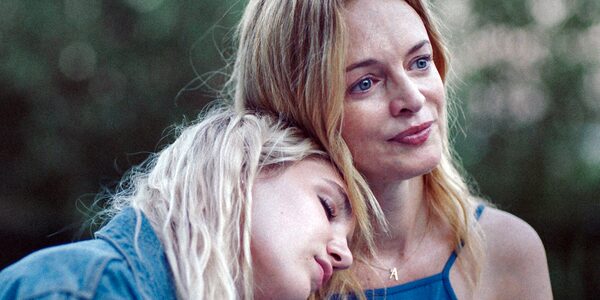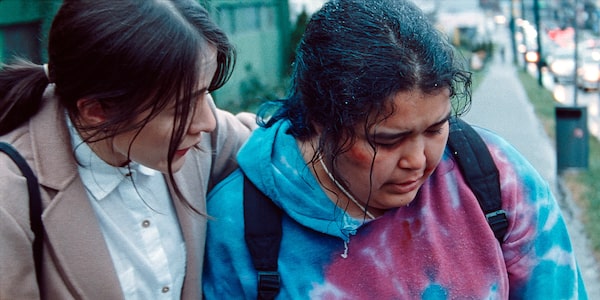Tom Hanks stars as Mister Rogers in A Beautiful Day in the Neighborhood.LACEY TERRELL/Sony Pictures
In the onslaught of autumn entertainments, one trend may surprise you: Goodness. A number of films are asking, ‘What does goodness look like in 2019? Do we trust it when we see it? What does it cost us? Why don’t we choose it more often?’ These films prove what I’ve long believed, that people struggling to behave well can be as dramatic as people behaving badly.
Of course, it’s partly coincidence that so many goodness-themed films are arriving now; many were in the works for years. But at this moment - when the U.S. President is a flagrant racist, who insists on easing pollution restrictions; when cops in Hong Kong are spraying protesters with blue dye to make their arrests more convenient; as Britain is reeling from the consequences of self-interest; as Canadians head to the polls to decide how they define goodness – these movies feel timely and urgent.
It might be a cheat to start with A Beautiful Day in the Neighborhood, directed by Marielle Heller (Can You Ever Forgive Me?) and due Nov. 22, because its subject, the late, beloved children’s TV icon Fred Rogers, was so fundamentally good, nothing but good, Good with a capital G. (More than one person has suggested to me that he was the Second Coming, and it’s our bad that we didn’t recognize him.)
But the story is such a perfect example of my point: A jaded Esquire journalist based on Tom Junod (Matthew Rhys), sent to profile Mister Rogers (Tom Hanks), at first can’t accept what he sees. Rogers is too kind, too generous; he can’t be for real. But gently, through pure frickin’ love, Rogers breaks down the journalist’s defences, opens his heart and helps heal his broken life.
“To every adult, Rogers is either a saint or a fraud,” Hanks told the audience after the TIFF premiere, which is why he spent his prep time probing “the mystery of Rogers’s motivation.” In this skeptical age, our default belief is that Rogers was a fraud, because we can’t process the alternative: that his motivation wasn’t a mystery at all, it was plain kindness. The film asks why cynicism is our comfort zone, and makes us think about what life would be like if we toggled over to goodness more often.

Heather Graham plays a children's book author who befriends the woman her ex-husband left her for when he suddenly dies.Babe Nation Creations
In film after film this season, the bravest act is generosity. “Your need to be a saint is pathological,” Aster (Sophie Nélisse) snaps to her mother Cami (Heather Graham) in the coming relationship drama The Rest of Us. When Cami’s ex-husband dies, suddenly and in debt, Cami befriends his second wife, Rachel (Jodi Balfour) – the woman he left her for. At first, we side with Aster because Cami’s motives are murky. But the truth is, both women are exhausted by the old habit of loathing each other as rivals. When Rachel finally asks, “Would it be crazy if we just called it even?” both of their lives get better.
In the coming British comedy How to Build a Girl - written by Caitlin Moran, based on her own memoirs - a budding rock critic (Booksmart’s Beanie Feldstein, perfectly cast) achieves instant success through mean-spiritedness. But eventually, she chucks it all for expansiveness of spirit instead. As her new editor (Emma Thompson) tells her, “Being in love with the world, that’s your thing.”

And the Birds Rained Down shows how one small kindness can change multiple lives.Outsiders Films
In And the Birds Rained Down, a gorgeous meditation on unexpected love from the Quebec director Louise Archambault (Gabrielle), one small kindness – to take an older woman (Andrée Lachapelle) for one afternoon out of the institution where she’s spent her life – changes a half-dozen lives for the better. (It’s out now in Quebec, and will open in the rest of Canada in the coming months.)
In The Body Remembers When the World Broke Open, set in Vancouver and directed by Kathleen Hepburn and Elle-Maija Tailfeathers, a similar decision – a stranger (Tailfeathers) helps a crying woman on the street (Violet Nelson) – makes the case for people to look out for one another, especially those whom no one else is caring for.

The Body Remembers When the World Broke Open makes the case for people to look out for one another.Experimental Forest Films
And in three other films, the stakes are upped: Individual acts of goodness make things better for humankind. Harriet, directed by Kasi Lemmons (Eve’s Bayou), gives the full hero treatment to Harriet Tubman (Cynthia Erivo), the escaped slave who risked her own life again and again to become a leader of the Underground Railroad. (It’s due Nov. 1.). Just Mercy, directed by Destin Daniel Cretton (Short Term 12), tells another true story about a Harvard-educated lawyer (Michael B. Jordan) who dedicates his life to bringing justice to death-row inmates in Alabama, including one played by Jamie Foxx. (It’s due in January.) And the coming documentary There’s Something in the Water, co-directed by Ellen Page, introduces us to environmental activists in Nova Scotia, who are fighting big business – and racing against time - to save wild places from destruction.
Those three latter films make the case that goodness is even more possible when it’s approached collectively. The way may be dark and a lone individual is easily lost, but if good people join forces, no enemy is too strong. “What affects one of us affects us all,” Page says in voice-over at the end of her doc. “You have the power of life. Use it.”

American abolitionist Harriet Tubman gets the hero treatment in Harriet.Glen Wilson/Focus Features
These films know that it’s not only sadness that makes us cry – it’s also generosity, when someone reaches out. It can be something as simple as a scene in the coming British film Rocks, when one teenage girl says to another, “Come sit over here.” Suspense isn’t only the purview of thrillers – your heart also pounds as you watch a character you’ve come to care about choose whether or not to do the right thing.
In fact, there’s nothing scarier than goodness and nothing safer than being jaded. Because goodness leads to hope and hope can be crushed as carelessly as a paper cup. What would happen, Marielle Heller asked the Beautiful Day in the Neighborhood audience, if we were able, as Fred Rogers was, to be present in every moment? Why do we choose to live as though that’s impossible? What stops us from believing that goodness is better?
Live your best. We have a daily Life & Arts newsletter, providing you with our latest stories on health, travel, food and culture. Sign up today.
 Johanna Schneller
Johanna Schneller